Written by Joel T. Lewis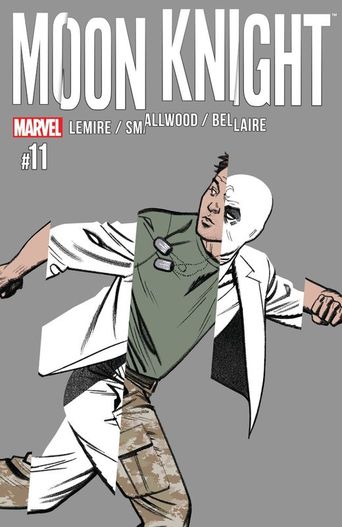 In the past 10 issues of Moon Knight there has been a considerable amount of uncertainty. As we have followed Marc Spector’s shifting realities and corresponding identities we have not been able to make any definitive claims about the actual history of Jeff Lemire’s incarnation of the character. There have been subtle references to possible pasts but much of the Moon Knight mythos has been wreathed in shadow as Lemire showcased the internal struggle of Marc Spector. But this current “Death and Birth” arc has begun to make definitive assertions about the history of Moon Knight through flashbacks. Last issue, Lemire showed that Spector developed his Dissociative Identity Disorder when he was a child and Khonshu’s manipulative influence began at the same time. Issue 11 follows Moon Knight’s journey into the Othervoid but also shows us more of Marc Spector’s past. I won’t disrespect Greg Smallwood’s wonderful artwork in this issue by telling you all that transpires as Mr. Knight navigates the Othervoid, is captured, and then taken to be sacrificed. Suffice it to say that I was reminded of the 1982 Arcade game Joust (and that is in no way a criticism). Mr. Knight discovers that he’s been sent back to rescue Anubis’ wife, Anput, who has been imprisoned by the same forces that call for his own sacrifice. Swallwood’s panels do not disappoint as Mr. Knight trades blows with soldiers who appear to be from ancient Egypt. Though I am very interested in Moon Knight’s looming final showdown with Khonshu, I have been more fascinated with how Lemire is filling in the Marc Spector origin story. There is no father-son boxing match in this issue but we do get to see Spector attend his father’s funeral and we meet Mrs. Spector for the first time. Approved for a week away from Putnam Psychiatric Hospital so that he may attend his father’s funeral, young Marc Spector argues with his Mom over whether or not his father would have wanted him to attend. Marc’s belief that his father was ashamed of his son and was happy to send him away shows the resentment Marc has been cultivating since he’s been away. His mother assures him that his father only wanted him to get better, but when Marc begins to transition into Jake Lockley to help him cope with the passing of his father she responds with frustrated anger. You can easily read the tension and resentment in the Spector household in so few pages and you don’t blame Marc when you see him run away. We then fast-forward to Marc’s deployment to Iraq and discover that he’s been sleepwalking. Into minefields. Spector hears the ominous call of Khonshu across the desert sands and isn’t able to resist its pull. Private Spector’s history of strange behavior throughout his two tours in Iraq prompts his commanding officer to investigate his past. He discovers that Private Spector lied on his recruitment forms about his history of mental health problems which leads to his dishonorable discharge from the Marine Corps. Following the voice of Khonshu and afraid of returning to the states and to Putnam Hospital, Marc runs away again. When we fast-forward again, we find Marc in the middle of an unlicensed boxing match, beating the hell out of another man. After the fight Marc talks with a man who’s admired his skill from afar and has noticed his tendency to shift from persona to persona. The man asks if Spector would like to go into business together and when he agrees we discover the man to be Jean-Paul “Frenchie” DuChamp, Moon Knight’s dear friend and pilot. 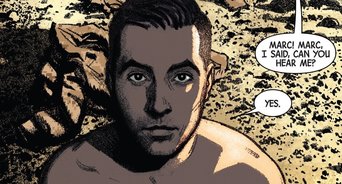 Once again Jeff Lemire has artfully filled in a blank section of Marc Spector’s origin story. Before this issue, Spector’s military service was only ever mentioned in passing and never with any detailed specifics. It was never clear which war he had seen action in, what rank he attained, or what circumstances led to his departure. Now Lemire has answered all those questions and given us a better understanding of how Khonshu influenced the crucial events in Marc’s life. This issue also demonstrates the first tactic Marc employs to cope with his Dissociative Identity Disorder: running away. Smallwood’s panels showing Marc fleeing from his father’s funeral and from the military base in Iraq echo one another and show a scared, frustrated young man who doesn't fit in where he thought he did. He's told by his commanding officer that the Marine Corps has no place for a man like him and his mother makes him feel unwelcome in his own home. All Marc can do is run. Until he meets Frenchie. In Lemire’s Moon Knight origin story Frenchie is the only person to have a favorable reaction to Marc’s shifting identities. Frenchie sees a powerful fighter with demons like everybody else but when he refers to Marc’s different personalities he almost shrugs it off. For the first time, someone responds to Marc’s condition with something besides fear and misunderstanding and it has a huge impact. We never really got to see what solidified Marc and Frenchie’s friendship in previous comics but this very brief meeting in issue 11 shows that from the very beginning Frenchie treated Marc like a human being. I imagine that this kindness in Frenchie is why they remained such firm friends over the years. The next issue of Moon Knight will pick up with the beginning of Marc Spector’s mercenary career and perhaps we'll catch a glimpse of his oldest and most ruthless enemy, Raoul Bushman. Until next time, Geek On!
0 Comments
Written by Joel T. Lewis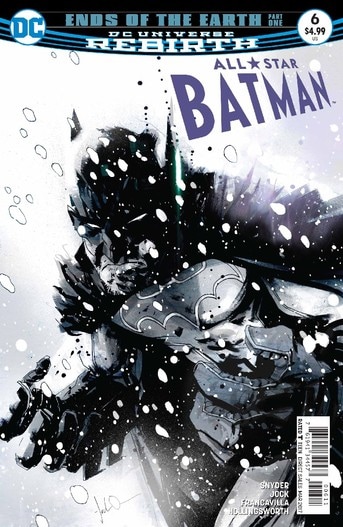 Issue 6 of Scott Snyder’s All-Star Batman shifts gears quite dramatically from the conclusion of the Two-Face storyline. With a new artist, a new villain, and a new setting, issue 6 feels like a brand new comic and is a great entry point into All-Star Batman if you missed the previous 5 issues (though it would be a shame to skip that storyline!). It’s also a great self-contained story that can be read in isolation if you just want to dip your toe into the series. Batman has tracked Dr. Victor Fries to an abandoned research outpost in the Alaskan wasteland. Throughout this series Scott Snyder has made a habit of taking Batman away from Gotham which allows him to showcase the hero’s resourcefulness and adaptability without relying on Alfred or his Batcave headquarters. This issue’s setting also allows Snyder to depict Mr. Freeze in a way we’ve never seen before: exposed. Mr. Freeze is a character defined by the fact that he is perpetually out of his element. He is literally separated from society by his environmental suit and whenever he is out of that suit he’s always restricted to cramped, uncomfortable settings. Whether it’s a refrigerated cell in Arkham Asylum or a Climate controlled lair Freeze is cut-off, isolated, and separate from humanity. But in this issue Freeze is out and about, finally at home in a climate that suits him and its Batman who’s sporting a high-tech climate suit. Snyder gives us an intimate look into Mr. Freeze’s dreams of a world where he might roam free, breathe air designed for him, and where he might father a whole generation of frozen silence. Batman experiences the isolation and immobility that Freeze has become accustomed to over the years in a suit meant to insulate him from exposure to the extreme cold. This inversion of isolation and insulation showcases how formidable Victor Fries really is even without his suit. Freeze plans to eradicate humanity with an ancient virus held within one of the earth’s oldest ice cores. Once humanity is gone, Freeze plans to replace it with a legion of reanimated cryogenic zombies. Yes, you read that correctly. Cryogenic Zombies. Now this is far from the first time we’ve seen the caped crusader trade blows with the undead, but I think it’s pretty safe to say that Batman has never dealt with this particular flavor of zombie before. These pale red-eyed creatures challenge even Game of Thrones’ White Walkers on the heebie-jeebie meter thanks to the chilling illustrations from artist Jock. The combination of Jock’s visceral outlines and Mike Hollingsworth’s use of light and color makes for a stunning comic that is both terrifying and beautiful. The stark contrast between the snowy landscape and the cavernous darkness of the ice caves is really breathtaking and you can almost feel the chill coming off the pages. Now, following this series throughout last year, I was impressed with the high gloss presentation and quality of each issue. This higher quality presentation along with the mini-comics at the end of every issue justified the higher price point of $4.99 per issue that I mentioned in my second article on All-Star Batman. However, this issue suffered a bit from poor quality control on the part of DC comics. As this issue came after the first of the year, a lot of space was taken up by promotional ads for upcoming publications, which is perfectly acceptable and understandable but, some of these ads interfered with the issue’s artwork by bleeding through from the other side of the page. Now, ads are something that have accompanied comics for decades, and for the most part they manage not to distract you from the narrative, but it’s disappointing to see artwork as outstanding as Jock’s interrupted by advertisements. Despite this tiny frustration, All-Star Batman No. 6 is a great one-off Mr. Freeze story that shows how far Batman will go to save humanity. This issue kicks off a story arc that will feature one big villain with each new issue, and the next installment will star Poison Ivy. Until next time, Geek On! Written by Joel T. Lewis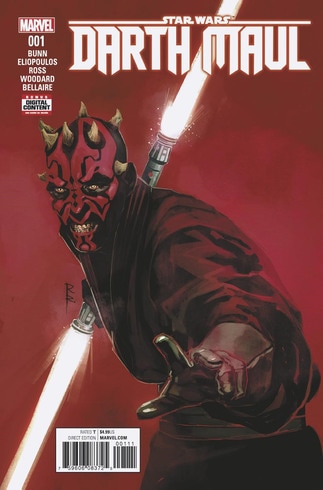 As long as I've been alive, there's never been a better time to be a Star Wars fan. With two reasonably well received films in the last two years, the Rebels TV show, and a wash of new novels and canon comics the Star Wars franchise is alive and well. Not that it ever really went away, as countless games, novels, and comics throughout the years can attest. But, it has been an uneasy time in terms of taking in new content, at least for me. As a child I spent many a night huddled under my covers with a flashlight desperate to finish one more page, one more chapter of the dozens of Star Wars Expanded Universe (EU) novels I collected from countless birthday lists and my local library. I read them at recess at school, despite the jeers of the other kids. I made lightsaber crackles and thrums with my mouth as I dreamed of fighting at the side of Luke Skywalker or swooping in from above in a T.I.E. Interceptor going full throttle. I lived in the Star Wars Universe thanks to those novels. Now when George Lucas sold the rights of the franchise to Disney they assembled a committee to determine the future the universe I had treasured for so long. The result of that meeting was that the stories I grew up reading were to pass into legend and going forward all new content would be considered true canon. Now I'll be the first to admit that the worst thing about Star Wars fans is our inability to accept what we deem to be inappropriate or unnecessary changes to our favorite universe. Take midichlorians, or the prequels, or Anakin’s sand speech in Attack of the Clones for example. We love to take apart and complain about what Lucas or whoever did to our Star Wars. I realize it's not as if Disney came into my library and burned my copies of the Thrawn Trilogy or the Rogue Squadron series but learning that stories that were such a big part of my childhood, of my budding imagination as a kid, weren't part of the Star Wars story anymore cut me deep. As a result, I have been timid with respect to the flurry of new canon material that has come out since Disney acquired Star Wars. I didn't really want to invest myself in new stories that would gloss over the ones I had grown to love or devour a new canon when the old was snatched away so easily. That's not to say I haven't been curious. I’ve looked over the new novels, and watched a bit of Rebels, but I was really interested in re-entering the Star Wars universe through comics. I had heard that Marvel’s newest Star Wars comics were exceptional but was unsure whether I should catch up on the main title or follow Solo, Princess Leia, or Poe Dameron. Then I heard that Darth Maul was getting a new comic and less than a week later I bought and devoured the issue I'm about to discuss. 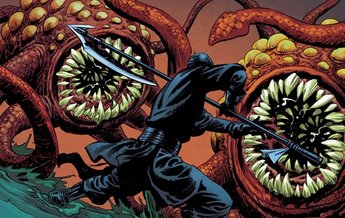 Maul was always characterized in the old EU as a man composed of frustrated anticipation. He was trained to be a weapon, hell it’s even in his name, Maul, but much of his time was taken up with cloak and dagger missions where his main objective was to avoid direct conflict with the Jedi. In his frustration and fundamental belief that his talent was being wasted, Maul constantly set himself against every dangerous opponent he could find to test his skills as a fighter. This desperate search for a worthy opponent, for a true test of his skills was ever at the center of Darth Maul’s motivations. This spirit has carried over into this first installment of Darth Maul comics. In many ways this issue serves as a Darth Maul refresher course, reestablishing the tried and true character building that the old canon contributed to Maul’s legacy. It may seem a bit repetitive to veteran Star Wars fans but it is a great introduction to everything that made Maul such a compelling villain: his overwhelming desire to prove himself worthy of the Sith mission, the tenuous power dynamic between Maul and Darth Sidious, and most of all Darth Maul’s viciousness. At the beginning of the issue we find Maul in the middle of a recreational hunt in the jungles of the planet Twon Keetee. What's the dark lord of the Sith hunting you might ask? Rathtars. In just two pages, author Cullen Bunn establishes a through-line of continuity with The Force Awakens and sets one of the most formidable characters of the prequel era against one of the more vicious elements of the post-Empire period. But what's most impressive about the battle between these two forces of nature is that Maul engages the Rathtars with a pole axe and not his signature double-bladed lightsaber. This showcases the skill and fury of Maul’s fighting style but also enhances our anticipation to see his weapon of choice later in the issue. Maul returns to Coruscant and is scolded by his master for nearly being discovered by two Jedi prior to their meeting. Sidious warns Maul about not allowing his impatience to sabotage their grand scheme to overthrow the Jedi and dispatches him to rescue members of the Trade Federation from pirates. After a dogfight above the surface of the planet involving Maul’s starship the Scimitar (which is one of my favorites), Maul discovers that a crime boss has taken a Jedi Padawan and is holding them for ransom. Taking it upon himself to get to the Padawan before the Jedi, Maul slaughters all witnesses to keep his mission a secret from his master. Though this issue is basically a primer for what's to come, it's great to see Darth Maul come to life again before his first duel with Obi-Wan Kenobi and the obsession fueled episodes of the Clone Wars series that followed. If you think that a series centered on such an intense, vengeful character might be a little too dark to read month after month there is a surprise mini-comic at the end of issue 1 that was a great palate cleanser and really sold me on picking up the next issue. Until next time, Geek On! Written by Joel T. Lewis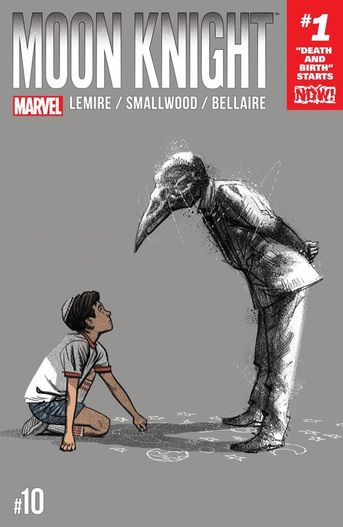 If it is not apparent by now I’m going to state it for the record officially: I adore Jeff Lemire. Thanks to this most recent series of Moon Knight I’ve been exposed to one of the most innovative and powerful storytellers of our time. I was wholeheartedly in his corner from the first issue of this series but with issue 9, Lemire cemented himself into my soul. Issue 9’s impact on me has been so profound that I’m still a bit raw emotionally from having written about it so recently. From the ending of issue 9 I wasn’t sure what to expect next from this series. Without the three conflicting identities that were so heavily featured in the previous 9 issues I wondered whether Lemire would follow a more conventional linear storyline or surprise me yet again. Lemire managed to do both. Issue 10 follows Marc Spector as he journeys back towards Mercy Hospital, determined to kill Khonshu but also gives us an intimate look at Marc’s childhood via flashbacks. Through these flashbacks Lemire reveals the origin of Spector’s Dissociative Identity Disorder but he also introduces a character from the Moon Knight mythos who we haven’t seen much of in recent years: Rabbi Elias Spector. The father of Moon Knight. Oh yeah, did I neglect to mention that the resurrected avenger of an Egyptian Moon God is the son of a Rabbi from Chicago? While Marc Spector has never met up with Ben Grimm at the Synagogue for Shabbat, his Jewish heritage is another aspect of Moon Knight that I thought was really unique when I first starting reading his comics. Though there are very few references to Spector’s Jewish heritage in the comics, it is one of the contributing factors to his estrangement from his father. While there have been several storylines that focus on Marc’s tumultuous relationship with his younger brother Randall Spector (which I hope to discuss soon as Lemire seems to be moving in that direction) much of Marc’s history before his mercenary days is left open to speculation. But at the tail end of the first Moon Knight series (1980) writer Alan Zelenetz shed some light on Marc’s rebellion against his religious father. As the first series of Moon Knight comes to a close, Steven Grant is in the process of filing away all of his files on his past life as Marc Spector. Pouring over old papers, film reels, and photographs Grant files each away, as if by organizing his past he might erase the violence of his life as a Mercenary. But a phone call from the bedside of his ailing father prompts Spector to recount the story of their 18-year estrangement. When Elias Spector and his wife fled German-occupied Czechoslovakia for the sanctuary of the new world he had already gained acclaim as a student of the Jewish faith. Ordained at 18, Elias was known for his brilliant mind and specialization in Kabbalah, Jewish Mysticism. Unfortunately, Chicago was not the safe haven Elias intended for his family as he was brutalized one night by a street gang who carved a swastika into his forehead. The trauma of this event and the way Elias responded to it deeply affected young Marc. The Rabbi chose to not to retaliate. Mistaking his father’s passivity for cowardice young Marc distanced himself from his father and his religion. Elias widened this gap by attempting to persuade Marc to follow in his footsteps as a rabbi. 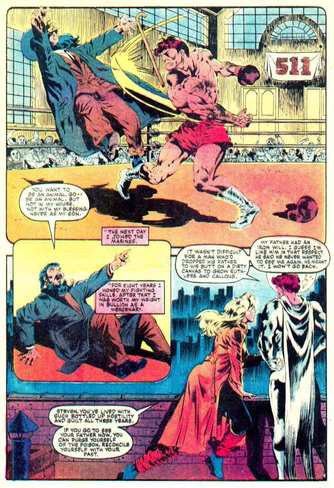 Marc’s frustration at his family’s persecution fueled his desire to defend himself and he spent his days training at the local gym. Eventually, Marc began to box for money and was skilled enough at 18 that he was seriously considering a career as a professional. Marc had hidden this violent life from his pacifist father but he could not deceive him forever. Elias confronted his son inside the ring, chastised him for the violence of the living he was making, and demanded that he give it up and return home. Marc responded by knocking his father across the ring with a powerful right hook and that was the last time the two men saw each other for 18 years. Since 1984 this has been all we’ve known about Marc Spector’s relationship with his father. Though many aspects of Moon Knight’s mythology have been revamped over the years, this storyline has been left untouched. While there is some sense of reconciliation between father and son at the close of issue 38, the legacy of this family dysfunction informs every incarnation of Marc Spector. Marc’s fierce loyalty to the Moon God Khonshu for example, may stem from the absence of a strong fatherly influence in his life. By resurrecting Marc and creating Moon Knight, Khonshu became his new father, at least in a spiritual sense. Also, by refocusing and encouraging the violence Spector’s father chastised him for, Khonshu gave Marc the acceptance that Elias wasn’t able to. But when we meet Elias Spector in 2016 it is long before Marc turns 18. Lemire shows Elias as a troubled parent struggling to understand his son’s shifting personalities. Unsure of what he can do to help he takes Marc to a psychiatrist and we learn that he must undergo special treatment away from home. You feel the compassion and concern in this father’s eyes as he realizes he can’t help his son by himself and instead of a pillar of piety we get to see Elias as a man just trying to be a good father. While there’s still potential for a boxing ring confrontation between father and son in the coming issues, Lemire adds both humanity and intimacy to Marc and Elias’ father/son relationship as they come to terms with Marc’s mental health. If we do see a Spector vs. Spector bout in the coming issues the stakes and the emotional weight of that event will be considerably greater than ever before. Returning to the story, as Marc listens to his father and psychiatrist’s muffled discussion from the hall Khonshu appears for the very first time. By bringing Khonshu in this early in Spector’s history, Lemire also extends the depth of the Moon God’s influence on Marc’s life. Khonshu calls young Marc his son and tells him that one day he will come to the Moon God and be complete, planting the seeds of dependence and manipulation that will plague Marc for decades. Back in the present, Marc reunites with Gena and they talk about Spector’s confused sense of reality and his mission to return to the hospital over pancakes. Spector then travels underground in search of Crawley and Anubis. Bargaining for his friend’s soul, Marc agrees to descend into the Othervoid to retrieve something Anubis lost there a long time ago. As Spector dives into the Othervoid returning artist Greg Smallwood really shines. Color, scale, and gravity twist and meld as the issue wraps up and Marc arrives in the Othervoid. I won’t spoil what he discovers there, but it blew my mind. I’m not sure I’ve ever had the experience of coming to the end of a comic book with as much excitement and curiosity about what came before as what is going to happen next! Until next time, Geek On! Written by Joel T. Lewis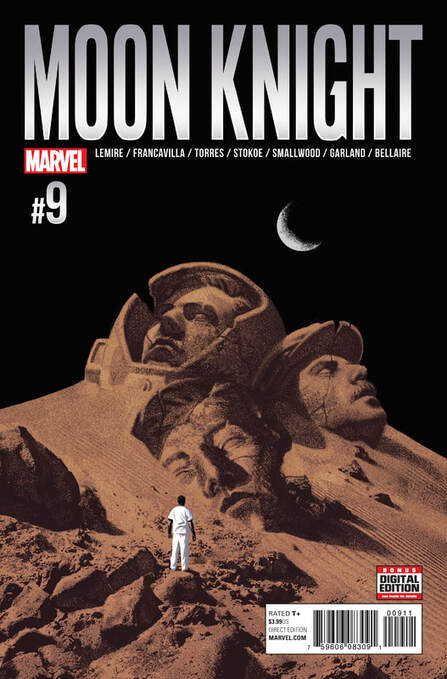 There is a tried and true way to determine whether or not I’ve been moved by something I've read. You'll see me finish a sentence, look away from the page, and put whatever I'm reading down for a minute. Everything I've ever read that's had an impact on me has made me do this. At the end of a line I'm so blown away that I have to let the moment sit in my mind. I have to breathe it in before I continue. I've sung the praises of Jeff Lemire’s Moon Knight for 8 articles straight and it’s because every single issue has made me do this. But then with the 9th issue, Lemire gave Moon Knight fans, gave me, something so breathtakingly beautiful that I have been nearly moved to tears with each re-reading. This is perhaps the comic book that means the most to me and here’s why. In the 200+ issues that bear his name and the countless appearances he’s made as an Avenger, Defender, Hero for Hire, and Marvel Knight, Moon Knight has never treated his psyche gently. He’s always been a splintered figure, as much in conflict with himself as with the Bushman or Black Spectre. Throughout his publication we’ve seen Marc Spector batter, abuse, suppress, and conceal his multiple identities in order to present himself as a sane man. In the beginning he used his fractured psyche to divide himself between the violence of the street, the comfort and intimacy of his home, and the twisted darkness of his past. Despite his best efforts, Moon Knight was never able to keep his personalities separate. This fact has always been met with conflict and censure. When the darkness of Marc Spector’s past creeps in and affects Marlene’s relationship with Steven Grant, Grant attempts to stamp out that persona, denying his past. When working with the West Coast Avengers, Moon Knight doesn’t reveal his confusion of personality with his teammates out of fear of expulsion. Even in the throes of Civil War, Iron Man decides against arresting Moon Knight for fear of worsening his mental health and Captain America refuses to recruit him because of his unpredictability. With each new chapter in the Moon Knight saga writers have reshuffled and highlighted each of his personalities but they have always been portrayed as blunt tools to accomplish certain goals or inconvenient barriers that negatively affect Moon Knight’s ability to connect to those closest to him. True to form, Jeff Lemire’s 9th issue pays a heartfelt tribute to the history of Moon Knight, while blazing a bold new trail with how he handles the character’s splintered psyche. Marc Spector tells Jake Lockley, Captain Spector, and Steven Grant that while they are all aspects of his mind, they don’t really exist. Understandably, they don’t take this news too well and interrogate Spector, probing for some hidden agenda. Marc explains that he has to deal with each of them in order to move forward. Grant asks how the sand-covered landscape of his Marvel Studios movie has come to life and Spector tells him there is no movie, calling him by his name. Grant asks, 'You know me?' Spector replies, 'Of course I do. I’ve known you the longest Steven.' He goes on to identify Jack Lockley as another of his old aliases. As Marc points to Captain Spector, acknowledging how new and bizarre this persona seems to him, we are treated to the last panels of James Stokoe. Captain Spector cries out for help as he dissolves into sand carried away by the wind. Next, we shift to the art style of Francesco Francavilla as Jake Lockley (Dressed as Moon Knight) attacks Marc, accusing him of murdering the Captain. 'What did you do to him?' Lockley shouts as he slugs Marc across the face. Marc responds with the not-so-sinister truth, 'Just confronting him did it. He was weak. Not fully formed, just a sketch, really.' Lockley reaches for the truncheon strapped to his leg, hell-bent on duking it out with Marc. Marc begs him to reconsider, 'I don’t want to fight you. Fighting you is what I’ve always done. And it led us here. I want to try a new way...a better way. I want to acknowledge you. Accept you. And then move on.' Lockley ignores this earnest request and presses the attack. Marc reluctantly fights back, accepting that since violence is all that Lockley understands, it is with violence that he must be dealt with. Pulling a crescent dart from inside his suit coat, Marc apologizes to Lockley, 'I’m sorry it had to go this way...Yes I’ll always need you...a part of you anyway.' Lockley falls and disappears in a cloud of sand. Marc turns to face Steven only to discover that he’s run away. Calling his name, Marc follows his footsteps in the sand down the abandoned streets of New Egypt and catches up with him in an empty office building. Grant has stopped running and can’t understand how he isn’t real. He remembers so much of his past: Coney Island, and seeing movies, and falling in love. How can that not be real? Marc kneels down to comfort Steven: 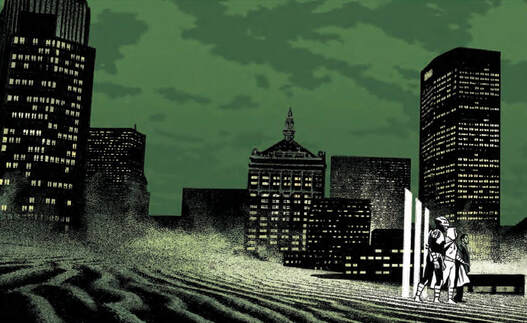 'Because it was real. You’ve always been with me. We shared our lives together. You were the first. You came to me when I was very young. At first I thought you were an imaginary friend that I would play with when I was alone at home. Then we weren’t playing together. I was you. Then I’d be me again for a while.' Marc confides in Steven about the horror of waking up in a mental hospital and having his deepest fear realized: he was losing himself to madness. Through these panels brought to life by Wilfredo Torres, Jeff Lemire gives Marc something no other comic writer has, self-acceptance. Marc tells Steven: 'I--I’ve been sick my whole life. And I’ve felt ashamed of that. I tried to hide it. I think that’s what the mask really was. Another way to hide. But I don’t want to hide anymore. I don’t want to be ashamed anymore. I just want to be me. I know I will never be cured. But I need to at least find a better way to live with this.' Marc asks Steven if he will help him. Help him restore his identity and find himself again. Steven agrees with one condition, 'Promise me you’ll find a way to be happy.' As the two men embrace Grant disappears and Marc is left alone. In almost deafening silence Marc Spector feels the most clear-headed he’s been in 9 straight issues. And he has a plan. 1. Go back to the hospital and 2. Kill Khonshu. Now I know this is an especially long recap but I just have to make a few more points before I put this issue away for a while. First I want to address Marc Spector’s description of the Captain Spector/Werewolves on the moon storyline as just a sketch. Marc Spector the Starfighter and his quest to defend the human refugees on the moon from an invasion of space werewolves is one of the most ambitious re-imaginings of Moon Knight ever. Jeff Lemire could have written a 10 issue series of that storyline by itself and I would’ve bought every issue. But he didn’t. He introduced that storyline and that persona to make a point about how integral Jake Lockley and Steven Grant have been to the history of Moon Knight and he allows that storyline and character design to fade away for the sake of the larger narrative. Ambition, innovation, and respect for the history of the character. I cannot say it enough, Jeff Lemire was born to write Moon Knight Comics. Next I want to talk about what Lemire does with Marc Spector and Steven Grant’s relationship. Never before in a Moon Knight comic has Steven Grant existed before Marc Spector’s death in Egypt. By extending their history back to Marc’s childhood, Lemire contributes a humanity and an innocence to Spector’s identity disorder. Marc’s splintered psyche is not the result of a near-death experience at the feet of a Moon God statue or an actual death and resurrection at the hands of an Othervoid god. He was born with his mental condition. He mistook a fragment of his mind for an imaginary friend and shared his whole life with him. Suddenly Marc’s mental health problems aren’t some cruel cosmic violation, some unnatural joke that he’s been plagued with because of a vengeful god. Spector is human and his is the kind of pain that people cope with in real life. This has huge implications for the history of these two identities and I’m looking forward to going back and rereading some of the formative issues of Moon Knight with this continuity in mind. Finally, I’d like to discuss Marc’s acceptance of his mental condition. I can’t quite explain how beautiful it is for a character to be as vulnerable, honest, and optimistic as Marc Spector is about his mental health. He acknowledges his fear and his shame. He accepts that his condition isn’t going away, but that doesn’t stop him from wanting to live a healthier life. Jeff Lemire has given Moon Knight and his readers an incredible gift with issue 9 and all I can say is thank you. Until next time, Geek On! |
Archives
May 2024
|
|
© 2012-2025, Nerds That Geek LLC.
All Rights Reserved. |
uWeb Hosting by FatCow
